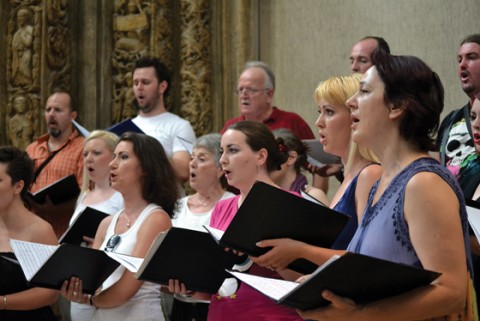Interfaith repertoire: A Bosnian choir sings reconciliation

It’s a summer evening in Sarajevo, and I’m at choir rehearsal. The director is working with the first and second tenors on a sensitive contrapuntal exchange in Antonio Lotti’s Crucifixus. They focus intently, trying to keep the tight dissonances intact.
Then a third voice pierces their subtle harmony. Undulating with an expressive vibrato, it begins to riff on an entirely different scale. The tenors’ wincing eyes dart confusedly at each other, and the director finally brings the cacophony to a halt. A chuckle drifts across the room as, one by one, we realize that it’s sunset and the third voice belongs to the minaret across the street, calling the faithful to prayer.
The Muslim voice’s complex melody clashes with the eight-part harmony of Baroque Catholicism. But it is by no means alien to the ensemble. The choir, called Pontanima, features voices from across Bosnia’s religious and ethnic spectrum: it’s part Catholic, part Orthodox, part Muslim, part Jewish and entirely Bosnian. Pontanima’s repertoire places the haunting drones of Rachmaninoff’s Vespers alongside Muslim ilahijas (praise songs) and the playful melodies of Sarajevo’s Sephardic community.





